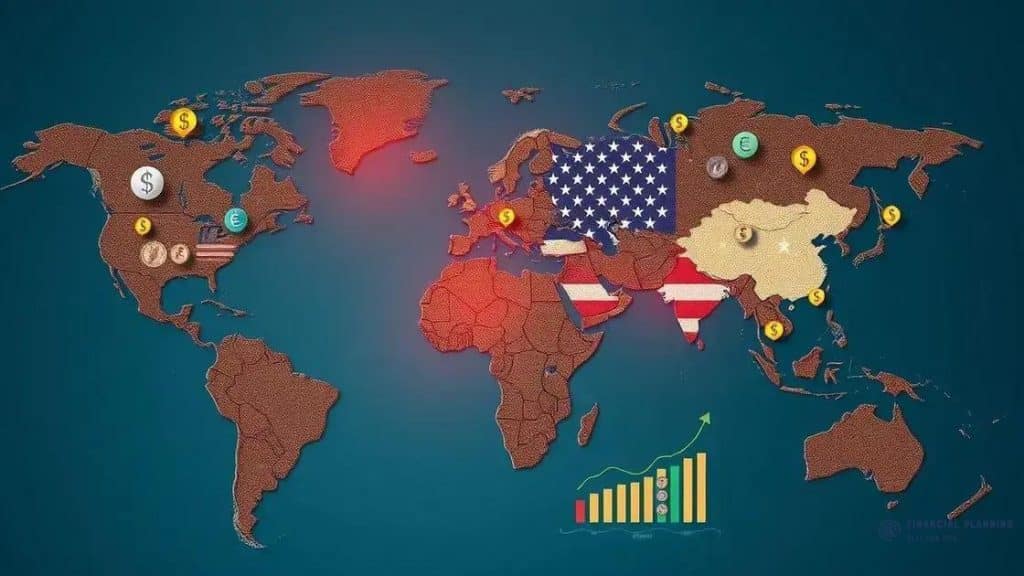Erosion of US exceptionalism in global investments

The erosion of US exceptionalism in global investments indicates a shift in investment strategies where innovation and sustainability are becoming key focus areas amid changing geopolitical dynamics and emerging market opportunities.
The erosion of US exceptionalism in global investments raises important questions about the future of the international financial landscape. What does this mean for economic power dynamics? Let’s explore how this shift influences global markets today.
Understanding US exceptionalism and its historical context
Understanding US exceptionalism is crucial to grasping its impact on global investments. This idea reflects the belief that the United States is inherently different from other nations. It’s not just a national pride; it has shaped historical policies and international relations.
The roots of this belief can be traced back to the early days of the nation. The founding principles emphasized democracy, individualism, and freedom, which contributed to a unique American identity. As the country grew, it became a symbol of progress for many around the world.
Key Historical Moments
Several key events exemplify the belief in US exceptionalism and its evolution:
- The American Revolution established a framework of rights and liberties.
- The Monroe Doctrine signaled a commitment to protecting democratic nations.
- The post-World War II era showcased America as a global leader, promoting democracy.
These instances not only highlight historical claims of US exceptionalism but also reflect on how these ideas influenced foreign policies, particularly in regards to investments abroad. As the nation positioned itself as a defender of free markets, it attracted international investments.
Impact on Global Perception
Furthermore, this exceptionalism fostered a sense of responsibility. American leaders believed they had a duty to spread democracy and capitalism. This perception often led to involvement in conflicts and partnerships around the world, affecting global investment flows.
However, this self-view has faced challenges in recent years. As global dynamics shift, the importance of embracing allies and adapting to new realities becomes more significant. The erosion of US exceptionalism prompts a reevaluation of how investments are viewed and made on the world stage.
Current trends in global investments

Current trends in global investments reflect significant shifts in how money flows across borders. Understanding these trends is essential for grasping the erosion of US exceptionalism in this area. Today, investors are more cautious and strategic, often looking for opportunities in emerging markets.
One noticeable trend is the increase in sustainable investing. More investors are now considering environmental, social, and governance (ESG) factors when making decisions. This shift indicates a growing awareness of ethical responsibilities in investment practices. Companies that prioritize sustainability often attract more capital.
Key Investment Trends
Several significant trends are shaping the current landscape of global investments:
- Diversification: Investors are diversifying their portfolios by including assets from various countries.
- Technology Integration: Advances in technology are streamlining how investments are managed.
- Impact Investing: Investors want their money to create positive social change.
In addition to these trends, geopolitical factors play a crucial role in investment decisions. Changes in regulations, trade agreements, and political stability can impact investor confidence. As nations navigate these challenges, the balance of investment power is also shifting.
Emerging Markets
Interest in emerging markets continues to rise. Investors are attracted to these regions due to their potential for high growth. Countries in Asia, Africa, and Latin America are gaining attention, offering profitable opportunities. However, these investments come with risks, including political instability and market volatility.
Global investors are adapting to these new realities. As the US influence in global investments fluctuates, understanding these trends becomes crucial for making informed decisions. Whether it’s sustainability or diversification, investors must stay ahead of the curve.
Impact of geopolitical shifts on US investments
The impact of geopolitical shifts on US investments is significant and complex. Recent years have shown that international relations can dramatically alter where and how money flows. Understanding these changes is essential for both investors and policymakers.
Political tension, trade wars, and global conflicts can all reshape investment strategies. For instance, tariffs imposed during trade disputes can increase costs and affect profit margins for US companies investing abroad. As a result, businesses may reconsider their global positions and investments.
Key Factors Influencing Investments
Several key factors contribute to the impact of geopolitical changes:
- Trade Policies: Changes in trade agreements can open or close markets for US companies.
- Political Stability: Countries with unstable governments may deter investors due to risk factors.
- Alliance Changes: Shifts in international alliances can influence investment flows significantly.
Additionally, the rise of emerging powers affects the landscape. Countries such as China and India are becoming significant players in global investments. This competition can challenge the traditional dominance of the US in various sectors.
Strategies for Adapting to Changes
Investors must adapt their strategies to navigate geopolitical shifts successfully. Vigilance in monitoring global events is crucial. Investors should consider diversifying their portfolios to manage risks associated with unpredictable political climates. They can also invest in countries with favorable relationships to the US.
The erosion of US exceptionalism means that American investors must rethink their historical advantages. As the world becomes more interconnected, understanding the complexities of geopolitical influences is essential for optimal investment decisions.
Comparative analysis: US vs. other global powers

A comparative analysis of the US and other global powers reveals the shifting dynamics in international investments. Understanding these differences is vital as the erosion of US exceptionalism unfolds. By looking at key players like China and the European Union, we can see how investment strategies vary.
The US has traditionally been viewed as a leader in innovation and technology. However, other nations are catching up. China’s rapid growth in tech shows they are becoming formidable competitors. They have invested heavily in developing infrastructure and digital technologies, making them attractive for global investments.
Investment Strategies Comparison
Here are some important factors to consider in comparing investment strategies:
- Economic Growth: China has experienced fast-paced growth, while the US is focusing on sustainability.
- Market Access: The EU offers strong regulatory frameworks, which can attract foreign investors.
- Innovation: Both the US and China invest in R&D, but their focus areas differ significantly.
In addition, geopolitical relations greatly influence these nations’ investment environments. The US often pursues a liberal approach, promoting free trade and open markets. In contrast, China may prioritize state-driven investments in key sectors to enhance its global influence.
Influences on Global Investment Trends
Emerging markets are also key players in this analysis. Countries in Africa and Southeast Asia are increasing their appeal to international investors. They often present high growth potential with favorable demographics. However, challenges such as political instability can pose risks.
As the global landscape shifts, understanding the motivations and strategies of these powers becomes essential. This comparative analysis helps investors navigate international opportunities while considering the impacts of the erosion of US exceptionalism.
Future outlook on US investments globally
The future outlook on US investments globally is shaped by various trends and challenges. As the erosion of US exceptionalism continues, investors are reevaluating their strategies. Understanding how these shifts will impact global investments is key for those involved in finance.
One significant trend is the increasing focus on innovation and technology. Companies are likely to shift their investments towards sectors such as artificial intelligence, renewable energy, and biotechnology. These industries not only promise growth but also align with global demands for sustainability.
Key Factors Influencing Future Investments
Several factors will shape US investments in the future:
- Regulatory Changes: New government policies can either promote or hinder investment opportunities.
- Global Market Dynamics: As emerging markets grow, they could either compete with US investments or become attractive options.
- Technological Advancements: Innovations will drive investment strategies across various sectors.
Additionally, geopolitical tensions may further influence the landscape. Investors must adapt to a world where political relationships can change rapidly. For instance, understanding how different nations view foreign investments will be crucial in minimizing risks.
Adapting to a New Investment Landscape
To succeed in this evolving environment, investors must remain flexible. Embracing new technologies and exploring diverse markets will be essential. As the global economy becomes more interconnected, companies will need to consider their impact on local economies and the environment.
Overall, the future of US investments globally depends on a mix of innovation, adaptability, and understanding of worldwide trends. By keeping these factors in mind, investors can position themselves strategically for success in a changing landscape.
The future of US investments globally reflects a landscape that is continually evolving. As we have explored, the erosion of US exceptionalism has led to changes in investment strategies, with a spotlight on innovation and sustainability becoming increasingly important.
Navigating geopolitical dynamics and understanding global market trends are crucial for investors looking to succeed.
The emphasis on technology and ethical investing will likely guide the direction of future investments, ensuring a balance between profitability and positive impact.
By remaining adaptable and informed, investors can stay competitive and make meaningful contributions in today’s interconnected world.
FAQ – Frequently Asked Questions about US Investment Trends
What are the key factors influencing US investments globally?
Key factors include regulatory changes, global market dynamics, and technological advancements that shape investment strategies.
How is technology affecting future investments?
Technology is driving investment towards innovative sectors like artificial intelligence and renewable energy, providing new opportunities for growth.
What does ethical investing mean?
Ethical investing focuses on generating positive social and environmental impacts while achieving financial returns.
Why is it important to understand global trends?
Understanding global trends helps investors navigate risks and opportunities, ensuring better decision-making in an interconnected world.





